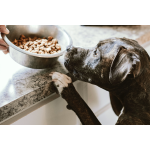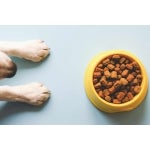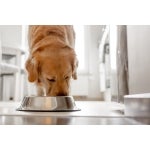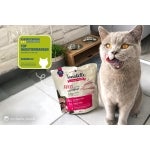
Feeding large breed puppies requires special care, as the growth and development of these dogs is unique. You can find out what to consider when feeding large breed puppies here.
Isn't a standard puppy food enough for large breed puppies? Our answer to this is a clear no. Our animal nutrition expert Dr Anna Mitura explains.
1. Specialised food for large breed puppies: Background & Composition
Large breeds, such as Great Danes, St Bernards or Irish Wolfhounds, go through a longer growth phase than smaller breeds, which can last up to two years. During this time, slow and even growth is crucial to avoid long-term health problems.
Too rapid growth in large breeds can lead to serious musculoskeletal problems, particularly bone and joint disorders such as hip dysplasia, elbow dysplasia or panostitis. These diseases often occur when the bones grow too quickly and do not have enough time to develop stably. It is therefore important that the food for large breed puppies is specifically geared towards slow growth.
The right choice of food plays a key role here. Large breed puppies need special food that is adapted to their particular needs. In particular, the protein, fat and mineral content must be carefully balanced. Too much protein in the food can accelerate growth and thus increase the risk of skeletal problems. At the same time, it is important that the food contains enough fat, but not too much, in order to avoid obesity, which would put additional strain on the joints.
Another important aspect is the ratio of calcium to phosphorus in the feed. This ratio is crucial for healthy bone development. An imbalance can lead to growth disorders and increase the likelihood of skeletal problems. Specialised food for large puppies takes these particular needs into account and thus supports even, healthy growth.
Last but not least, it is essential that the young dog always has sufficient fresh water available. Water is essential for digestion and numerous other bodily functions. Inadequate water intake can lead to dehydration and affect the dog's health in the long term.
2. How long should I offer my large breed puppy its junior food?
The question of how long large breed puppies should be fed special junior food is also much debated. Large breeds are often not fully grown until they are 18-24 months old. However, the main growth, especially of the skeleton, is largely completed in the first year. We recommend feeding our Maxi Junior up to 12 months and then slowly switching to a food for adult breeds. When the main growth is complete and the muscles in particular still need to develop, a reduced adult food is generally a good choice to prevent the development of obesity. Of course, in individual cases it may be advisable, depending on the breed, to continue feeding the junior food until the dog is 18 months old. The exact timing of the changeover depends on the individual breed and the dog's stage of development. During this time, it is important to monitor the growth phase carefully and consult a vet if you are unsure.


3. How many times a day should I feed my large breed puppy?
In addition to the amount of food, the frequency of feeding is also an important factor. Large breed puppies should be fed several times a day in the first few months of their lives to ensure an even supply of nutrients and to avoid overloading the gastrointestinal tract. With increasing age, feeding can then be gradually reduced to two meals a day.
It is essential to follow the manufacturer's feeding recommendations. These recommendations are based on scientific findings and are designed to support the puppy's optimum growth and healthy development. Overfeeding can quickly lead to obesity and the associated health problems. On the other hand, underfeeding can lead to the dog not receiving enough nutrients to develop optimally, which in turn can lead to deficiency symptoms and growth disorders. As a rule, however, overfeeding is the far greater problem, especially when many treats are used as rewards in training and daily education. Therefore, treats in particular should only be given with caution.
4. Snacks & treats
The normal junior food can also be used for simple daily training. A very special treat can then be used for particularly challenging or important training steps.
The greatest reward for a puppy is always the attention of its human anyway!
To summarise, it can be said that feeding large breed puppies contributes significantly to their healthy development. By choosing a special junior food that takes into account the specific needs of large breeds and strictly following the manufacturer's feeding recommendations, you can ensure that the puppy grows slowly and evenly.
With a balanced diet and sufficient water intake, your puppy will be ready for any adventure!
5. Do you still have questions about feeding large breed puppies?
Feel free to contact our nutrition experts in confidence, they will be happy to help you by e-mail and by telephone via our free hotline.
Phone: +49 (0) 800 333 8 222 (toll-free)
E-mail: expertenteam@bosch-tiernahrung.de
Monday - Thursday: 7.30 am - 12 noon & 1 pm - 4 pm
Friday: 7.30 a.m. - 12 noon & 1 p.m. - 3 p.m.
















